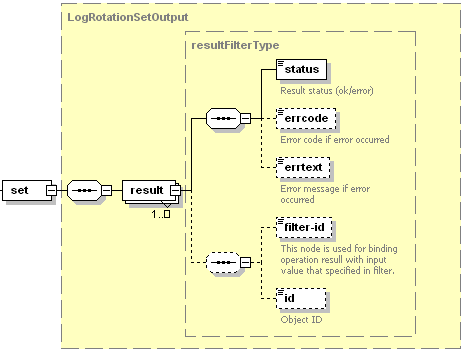Changing Log Rotation Settings
The set operation is used to change settings of Log Rotation.
Request Packet Structure
A request XML packet changing Log Rotation settings includes the set operation node:
<packet>
<log-rotation>
<set>
...
</set>
</log-rotation>
</packet>
The set node is presented by type LogRotationSetInput
(logrotation.xsd), and its graphical representation is as follows:

Note: The interactive schema navigator for all request packets is available here: http://plesk.github.io/api-schemas/1.6.8.0/agent_input.svg.
- The filter node is required. Specifies the filtering rule. For
more information, refer to the Available Filters
section. Data type: logRotationFilterType
(
logrotation.xsd) . - The settings node is required. It specifies Log Rotation
settings. For details, refer to the Log Rotation
Settings section. Data type: LogRotationSettingsType
(
logrotation.xsd) .
Remarks
You can use different filtering rules in a single packet. Add as many set operations as the number of different filtering rules.
<packet>
<log-rotation>
<set>
...
</set>
...
<set>
...
</set>
</log-rotation>
</packet>
Note: When creating request packets, put nodes and elements in the order they follow in the packet structure.
Response Packet Structure
The set node of the output XML packet is presented by type
LogRotationSetOutput (logrotation.xsd) and structured as follows:

Note: The interactive schema navigator for all response packets is available here: http://plesk.github.io/api-schemas/1.6.8.0/agent_output.svg.
- The result node is required. It wraps the response retrieved
from the server. Data type: resultFilterType (
common.xsd). - The status node is required. It specifies the execution status of the set operation. Data type: string. Allowed values: ok | error.
- The errcode node is optional. It returns the error code if the set operation fails. Data type: unsignedInt.
- The errtext node is optional. It returns the error message if the set operation fails. Data type: string.
- The filter-id node is required. It returns a filtering rule parameter. For more information, refer to the Available Filters section. Data type: anySimple.
- The id node is optional. If the set operation succeeds, it holds the ID of the site matched by the filtering rule. Data type: integer.
Samples
Changing settings of a single site
The following request packet changes Log Rotation settings of site example.com:
<packet>
<log-rotation>
<set>
<filter>
<site-name>example.com</site-name>
</filter>
<settings>
<log-condition>
<log-bysize>2073741824</log-bysize>
</log-condition>
<log-max-num-files>1</log-max-num-files>
<log-compress>true</log-compress>
</settings>
</set>
</log-rotation>
</packet>
Response:
<packet>
<log-rotation>
<set>
<result>
<status>ok</status>
<filter-id>example.com</filter-id>
<id>33</id>
</result>
</set>
</log-rotation>
</packet>
If the site was not found, the response from the server looks as follows:
<packet>
<log-rotation>
<set>
<result>
<status>error</status>
<errcode>1013</errcode>
<errtext>domain does not exist</errtext>
<filter-id>example.com</filter-id>
</result>
</set>
</log-rotation>
</packet>
If a packet sender has no rights to manage physical hosting, the response looks as follows:
<packet>
<log-rotation>
<get>
<result>
<status>error</status>
<errcode>1006</errcode>
<errtext>Access denied</errtext>
<filter-id>example.com</filter-id>
</result>
</get>
</log-rotation>
</packet>
If the site is not hosted physically, the response from the server looks as follows:
<packet>
<log-rotation>
<get>
<result>
<status>error</status>
<errcode>1034</errcode>
<errtext>The site is not hosted physically</errtext>
<filter-id>example.com</filter-id>
</result>
</get>
</log-rotation>
</packet>
Changing settings of multiple sites
The following request packet changes Log Rotation settings of domains used by the customers with ID 5 and ID 8:
<packet>
<log-rotation>
<set>
<filter>
<owner-id>5</owner-id>
<owner-id>8</owner-id>
</filter>
<settings>
<log-condition>
<log-bysize>2073741824</log-bysize>
</log-condition>
</settings>
</set>
</log-rotation>
</packet>
Response (if the customer with ID 5 was not found on the server and the customer with ID 8 runs two domains (ID 17 and 29)):
<packet>
<log-rotation>
<set>
<result>
<status>error</status>
<errcode>1015</errcode>
<errtext>customer does not exist</errtext>
<filter-id>5</filter-id>
</result>
</set>
<set>
<result>
<status>ok</status>
<filter-id>8</filter-id>
<id>17</id>
</result>
</set>
<set>
<result>
<status>ok</status>
<filter-id>8</filter-id>
<id>29</id>
</result>
</set>
</log-rotation>
</packet>